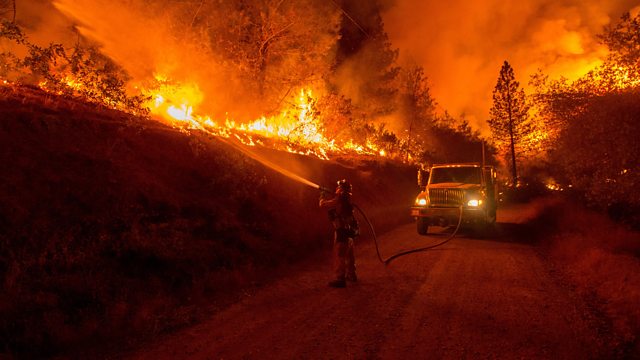Wildfires – What can Science Tell Us About Them?
Wildfires; Underwater coral microscope; Fecal transplants; Ancient monkey tool use; Why there is matter? Past and future of Zika virus
Wildfires have been hitting the headlines this year. But is the frequency and intensity of wildfires on the increase? Can science and mapping be used more globally to mitigate the devastation and understand the causes and effects? And will a warming climate mean bigger risk?
Coral Microscope
The invention of an underwater microscope is allowing scientists to see how corals behave in their natural environment in great detail.
Primate Archaeology
Researchers from Oxford University, working in Brazil, found ancient "nut-cracking tools" - 700-year-old stone hammers that capuchin monkeys used to open cashew nuts.
Faecal Transplants
Faecal transplants are becoming more and more popular to treat gut syndromes and auto-immune diseases. Bacteria are suspected to be the main actors behind the beneficial effects. However, stool actually contains an extremely diverse ecosystem and studying each species separately might be misleading.
Neutrinos
Results from an experiment that fires neutrinos across the width of Japan could explain the tiny differences in matter and anti-matter that allow the Universe to exist. According to our current understanding at the Big Bang equal amount of matter and antimatter were created. But this provides a problem, because when a matter particle meets its antimatter counterpart they disappear leaving behind just a flash of energy. Professor Hirohisa Tanaka explains that a tiny difference between neutrinos and their antimatter counterparts could be showing the difference that allowed 1 ten billionth of the matter at the Big Bang to survive and create everything we see around us today
Past and Future of Zika Virus
The Zika virus outbreak in Latin America and the Caribbean has been raging for over a year, and some scientists are thinking that the outbreak might have hit its peak. But what will happen in the future, will this be an end to the outbreak or will Zika continue to cause problems in the area for decades to come. Understanding where the virus came from and knowledge of how related viruses, like dengue and Yellow Fever, behaved when they were introduced into the Americas may provide some important insights.
(Photo: US Fires. Credit: Josh Edelson/AFP/Getty Images)
Last on
More episodes
Previous
Broadcasts
- Thu 14 Jul 2016 21:32GMTÂ鶹¹ÙÍøÊ×Ò³Èë¿Ú World Service except East and Southern Africa & News Internet
- Fri 15 Jul 2016 01:32GMTÂ鶹¹ÙÍøÊ×Ò³Èë¿Ú World Service Americas and the Caribbean
- Fri 15 Jul 2016 02:32GMTÂ鶹¹ÙÍøÊ×Ò³Èë¿Ú World Service Online, Europe and the Middle East & UK DAB/Freeview only
- Fri 15 Jul 2016 03:32GMTÂ鶹¹ÙÍøÊ×Ò³Èë¿Ú World Service East Asia & South Asia only
- Fri 15 Jul 2016 04:32GMTÂ鶹¹ÙÍøÊ×Ò³Èë¿Ú World Service Australasia
- Fri 15 Jul 2016 06:32GMTÂ鶹¹ÙÍøÊ×Ò³Èë¿Ú World Service East and Southern Africa & Europe and the Middle East only
- Fri 15 Jul 2016 14:32GMTÂ鶹¹ÙÍøÊ×Ò³Èë¿Ú World Service except News Internet
Podcast
-
![]()
Science In Action
The Â鶹¹ÙÍøÊ×Ò³Èë¿Ú brings you all the week's science news.


